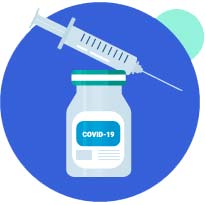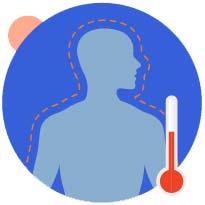Healthy Living
How COVID-19 Vaccines Work
 COVID-19 Vaccines COVID-19 vaccines help our bodies develop immunity to the virus that causes COVID-19 without us having to get the illness. Different types of vaccines work in different ways to offer protection, but with all types of vaccines, the body is left with a “memory” about how to fight that virus in the future. |
 Timing Matters It typically takes a few weeks for the body to produce virus fighters after vaccination. It’s possible to be infected with the virus that causes COVID-19 just before or just after vaccination because the vaccine did not have enough time to provide protection. |
 Symptoms May Appear The process of building immunity can cause symptoms, such as fever. These symptoms are normal. |
Types of Vaccines
Currently, there are three main types of COVID-19 vaccines that are EUA approved in the United States. Below is a description of how each type of vaccine prompts our bodies to recognize and protect us from the virus that causes COVID-19. None of these vaccines can give you COVID-19.
- mRNA vaccines contain material from the virus that causes COVID-19 that gives our cells instructions for how to make a harmless protein that is unique to the virus. After our cells make copies of the protein, they destroy the genetic material from the vaccine. Our bodies recognize that the protein should not be there and build T-lymphocytes and B-lymphocytes that will remember how to fight the virus that causes COVID-19 if we are infected in the future.
- Protein subunit vaccines include harmless pieces (proteins) of the virus that cause COVID-19 instead of the entire germ. Once vaccinated, our immune system recognizes that the proteins don’t belong in the body and begins making T-lymphocytes and antibodies. If we are ever infected in the future, memory cells will recognize and fight the virus.
- Vector vaccines contain a weakened version of a live virus—a different virus than the one that causes COVID-19—that has genetic material from the virus that causes COVID-19 inserted in it (this is called a viral vector). Once the viral vector is inside our cells, the genetic material gives cells instructions to make a protein that is unique to the virus that causes COVID-19. Using these instructions, our cells make copies of the protein. This prompts our bodies to build T-lymphocytes and B-lymphocytes that will remember how to fight that virus if we are infected in the future.
Most COVID-19 Vaccines Require More Than One Shot
The mRNA vaccines by Pfizer and Moderna require two shots for maximum effectiveness. The first shot starts building protection and gives you some protection against COVID-19. A second shot a few weeks later is needed to get the most protection the vaccine has to offer. The Johnson and Johnson vaccine is the only US EUA approved vaccine that only needs one shot.
Currently studies are ongoing to determine if and when additional shots (boosters) are needed to ensure the highest effectiveness of the vaccine against COVID-19.
The Bottom Line
Getting vaccinated is one of many steps you can take to protect yourself and others from COVID-19. Protection from COVID-19 is critically important because for some people, it can cause severe illness or death.
Stopping a pandemic requires using all the tools available. Vaccines work with your immune system so your body will be ready to fight the virus if you are exposed. Other steps, like masks and social distancing, help reduce your chance of being exposed to the virus or spreading it to others. Together, COVID-19 vaccination and following CDC’s recommendations to protect yourself and others will offer the best protection from COVID-19.
Source: Centers for Disease Control



